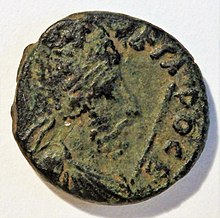| Abgar VIII | |
|---|---|
 Abgar VIII as King on the obverse of a Roman coin. | |
| King of Osroene | |
| Reign | 177-212 CE |
| Predecessor | Ma'nu VIII bar Ma'nu |
| Successor | Abgar IX |
| Born | Edessa, Upper Mesopotamia (modern-day Şanlıurfa, Turkey) |
| Died | c. 212 |
| Religion | Christianity |
Abgar VIII of Edessa, also known as Abgar the Great[1][2][3][4][5][a] or Abgar bar Ma'nu,[1][3][7] was an Arab[b] king of Osroene from 177 CE to 212 CE.[4][2][5][c]
Abgar the Great was most remembered for his alleged conversion to Christianity in about 200 CE and the declaration of Christianity as the official religion of the city at that time.[5][9][10] It has been suggested that a cross shown on the tiara of Abgar VIII in coins he minted has a Christian meaning.[11]
Osroene was a client state of the Roman Empire at this time.[1] Prior to Abgar VIII taking the throne, in 165 CE the Roman military had reinstated Ma'nu VIII[12] and they continued to have a significant presence in the region. Nevertheless, Abgar VIII's initial actions suggest that he was not wholly loyal to Rome nor was closely monitored by Rome. While Abgar VIII's coins bear the image of the Roman Emperor Commodus, Abgar's goals were to maintain a degree of independence and to extend his influence geographically as much as possible without disturbing the greater powers of Rome and Parthia.[7]
Abgar VIII supported Pescennius Niger as Roman Emperor in 193 CE. However Pescennius Niger was swiftly challenged and deposed by Emperor Septimius Severus. Abgar VIII's submission to Septimus Severus is portrayed on the Arch of Severus in Rome. He was not deposed, but Osroene was made a Roman province and Abgar's kingdom was reduced to a rump state containing just the city of Edessa.[2] Abgar was fully reconciled with Severus and was later received with honour as a guest of the Emperor in Rome.[1] In an additional display of loyalty, Abgar VIII took on the Roman name Lucius Aelius Aurelius Septimus.[6]
Christianity spread in Edessa significantly during Abgar VIII's reign.[1] The Chronicle of Edessa (540 CE) reports that a Christian church building in Edessa was damaged in a flood in November 201 CE.[1] The Christian philosopher Bardaisan was a member of Abgar VIII's court.[3]
In 1904 Adolf von Harnack proposed that Lucius of Britain, a ruler mentioned in the Liber Pontificalis as contemporaneous with Pope Eleutherius, actually was Abgar of Edessa. Harnack argued that 'Britanio' was written as an erroneous expansion for 'Britio', a citadel of Edessa. Harnack's proposal has been challenged by British archaeologist David J. Knight, who argued that Abgar of Edessa was never called Lucius of Britio/Birtha in contemporary sources.[13]
Upon his death in 212 CE,[6] Abgar the Great was succeeded by his son Abgar IX. However, Abgar IX was summoned with his son to Rome in 213 CE and murdered on the orders of Caracalla.[14] A year later Caracalla ended the independence of Osroene and incorporated it as a province into Roman Empire.[15]
- ^ a b c d e f Healey 2009, p. 15.
- ^ a b c Ball 2016, p. 98.
- ^ a b c d Drijvers & Healey 1999, p. 37.
- ^ a b Dewing, Kaldellis & Mladjov 2014, p. 98.
- ^ a b c Guscin 2016, p. 9.
- ^ a b c Segal 2005, p. 14.
- ^ a b Ross 2000, p. 46.
- ^ Millar 1987, p. 151f.
- ^ Ball 2000, p. 91.
- ^ Shahid 1984, p. 47.
- ^ Sayles 1998, p. 61.
- ^ Healey 2009, p. 14f.
- ^ 'King Lucius of Britain' by David J. Knight (ISBN 9780752445724)
- ^ Ball 2000.
- ^ Ross 2000, p. 60-61.
Cite error: There are <ref group=lower-alpha> tags or {{efn}} templates on this page, but the references will not show without a {{reflist|group=lower-alpha}} template or {{notelist}} template (see the help page).